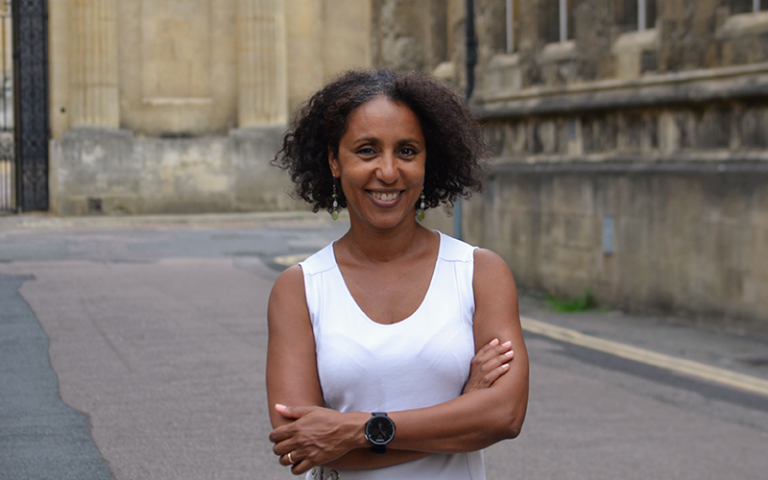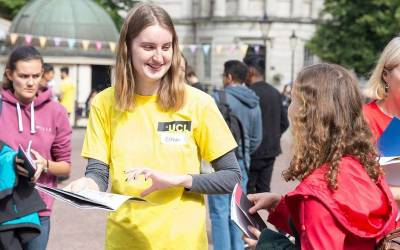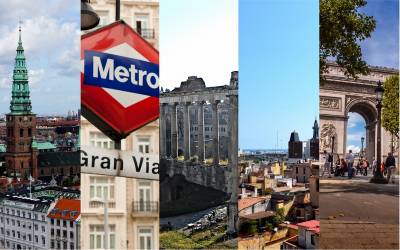Beyond Borders: Hélène Neveu Kringelbach
Dr Hélène Neveu Kringelbach, Associate Professor of African Anthropology and Vice Dean for Equality, Diversity, and Inclusion (Faculty of Arts & Humanities), is interested in mobility.

27 May 2021
Dr Hélène Neveu Kringelbach, Associate Professor of African Anthropology, has movement on the mind.
Though her research strands of dance and family migration may seem an uncommon pairing, they are united through the lens of mobility. Neveu Kringelbach has spent her career conducting research in Senegal, France, and the UK, exploring performance, family and migration, and the links between them.
“The opportunity for migration is often what attracts young people in Senegal into the performing arts world in the first place,” she says. “This is a profession that can enable you to travel.”
She was first drawn to the concept of mobility as a research lens while doing her postdoctoral research and teaching at Oxford, following her PhD. There, she was influenced by a group of migration scholars who wanted to flip the preconception that sedentary, non-mobile lives are the “default.”
She says that as a society, we have internalised the very powerful idea of national sovereignty, that we feel we “belong” in one place and “no longer know how to think outside the structure of states.”
““Really the default mode of life in some societies might be that people are mobile – what if mobility is what people want to do when given the choice?” she asks.
Mobility and families
In the past few years Neveu Kringelbach has been particularly interested in the impact of immigration policy on transnational marriage and family relationships. Her ongoing research, most of which is in France and Senegal, but also in the UK and Spain, consists of an ethnographic study of transnational families – some of whom she has followed from country to country over a decade.
While initially interested in intercultural, religiously mixed, interracial families and how they navigate these perceived differences, she has also become focused on families in context – and the impact of immigration policy and public discourses about migration on families stretched between Africa and Europe.
This area of migration, she says, is particularly interesting because it removes states’ agency in “choosing” who will be a migrant, and places it in the hands (and hearts) of individuals.
“Control of marriage migration and the intimate lives of families involving migrants is a major focus for European states,” she says. “Many European states think marriage is a ‘weak link’ in immigration policies. Given that you can’t prevent people from getting married, from the state’s point of view, control becomes a question of trying to delay the process through bureaucratic intimidation and harassment.”
She has witnessed in her research how many of these immigration hurdles are often gendered and racialised, in ways that suggest continuities with historical ways of controlling colonial subjects. Take her fieldwork with a French organisation advising people with marriage migration challenges: she describes this experience as “a great window into who was most likely to be harassed by the state or be the target of police inquires.”
Neveu Kringelbach notes that these policies do not only affect the partner who is migrating.
““French citizens subjected to enquiries into the nature of their relationship with a foreign (often racialised as non-white) partner expressed complete disillusion with the way their own state treated them,” she says. “Until then, they believed in the values of the Republic. Many had a sense of a wake-up call after months or even years of surveillance by the French state. Out of solidarity with their spouse or partner, some of them were forced to live like an undocumented person for prolonged periods of time and this profoundly affected their relationship to their own country.”
She plans to write a book on the relationships she has followed, though some have not stood the test of time, or have split up because of the difficulties of living a “normal” life together under the shadow of immigration policy.
Equality, Diversity, and Inclusion – Changing attitudes, changing minds
Many of the themes that emerge in her migration work – race, colonialism, prejudice – also appear in Neveu Kringelbach’s administrative role at UCL: She is the Faculty of Arts & Humanities’ first Vice Dean for Equality, Diversity, and Inclusion (EDI).
In this role, she has taken on the challenge of making the faculty more inclusive, and improving diversity at both the student and staff levels through changing recruitment practices and other actions.
“It’s the whitest faculty at UCL, so there is a lot of work to do,” she says. “But there is a lot of goodwill.”
She wants to ensure these initiatives do not become “just a box-ticking exercise,” but that ongoing, substantive work continues. She is optimistic about this, citing enthusiasm and support from UCL’s central EDI team, but notes that long-term changes will be an investment.
“You can’t change culture without it costing anything,” she says. “It’s going to take time, and there’s no guarantee of success. Solutions might look different across UCL.”
Neveu Kringelbach says that her experience in this role has caused her to think differently about her own research.
For many years, British anthropology has been “allergic” to questions and discussions of race, she says, a perspective that she has long internalised in her work and writing.
“From a biological perspective, race doesn’t exist, so if you talk about race you’re seen as part of creating a problem,” she says. “Being in this role has made me see things differently: avoiding the topic actually perpetuates systemic racism, and time has come to discuss these things more openly.”
Working with transnational and interracial families, race is in inherent part of Neveu Kringelbach’s work.
“For a long time, I was very afraid of talking about race – that if I wrote about it, people in my own discipline would accuse me of leaning toward cultural studies or doing something that wasn’t ‘anthropology,’” she says.
““Anthropology needs to tackle these questions, and not be afraid of them. If race is a concern in people’s lives, we have to analyse that, we have to talk about it, regardless of what others might think.”
 Close
Close




